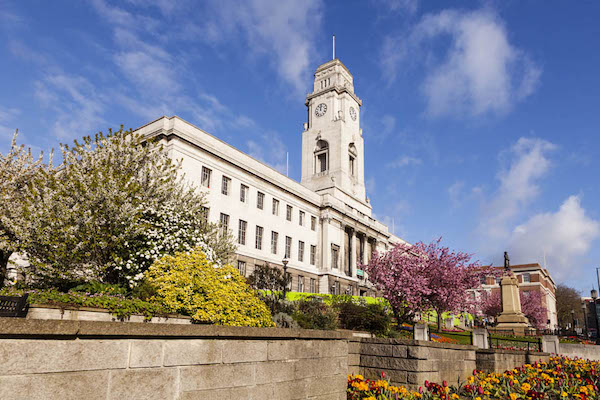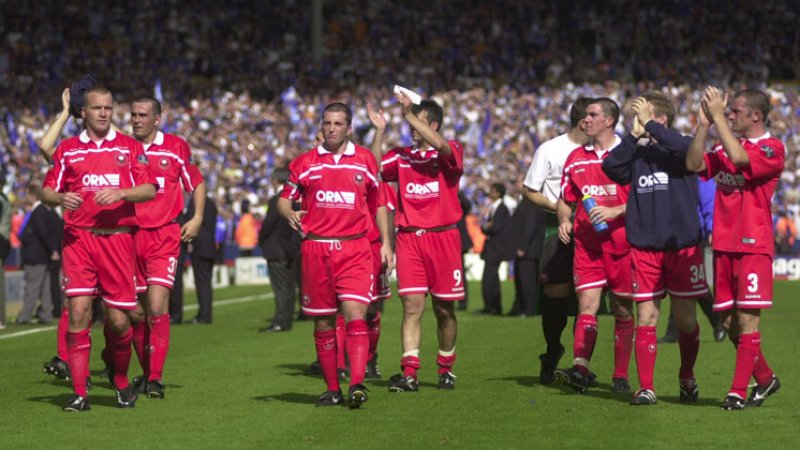ON MAY 29, 2000, more than 30,000 Barnsley fans travelled to Wembley Stadium where their club would be playing for the first time ever.
The world-famous ground had seen England lift the World Cup, London host the Olympics and Freddie Mercury wow Live Aid. It had hosted five European Cup finals and more than 70 FA Cup finals since its opening in 1923, but the 2000 Division One play-off final was its last ever competitive club match before the stadium was knocked down and a new namesake built on the same site.
The Reds – so close to a second top flight season after their 1997/98 debut – and Ipswich Town certainly lived up to the occasion. The two teams delivered a pulsating contest on a manic Monday which, in South Yorkshire at least, is agonisingly remembered as much for a missed penalty as for the six goals.
Barnsley, a club who had spent more than a century outside the top flight looking jealously in, while their town had – in recent decades – been ravaged by unemployment and poverty following the Miners’ Strike, were enjoying an unprecedented era of Premiership expectations. While the game was a gutwrenching rollercoaster of feelings for fans and players, it was a tipping point for the board members watching from the Royal Box with the club’s future potentially on a knife’s edge. They had spent big to get back to the promised land but the parachute payments were ending and the directors knew that, if they lost to Ipswich, the pursestrings would have to be significantly tightened for 2000/01, with top players sold, and it was highly unlikely that the Reds would compete for the ultimate promotion again.
And so it proved.
The following year, while Barnsley were heading into the third tier and lurching towards financial catastrophe due to the collapse of ITV Digital, Ipswich were beating Inter Milan in the first of two UEFA Cup campaigns having finished fifth in the Premiership.
On the day of the 2000 final, the UK number one was Melanie C’s ‘Never Be The Same Again’ – an apt title considering Barnsley’s post-Wembley struggles.
But all that was yet to come when Dave ‘Harry’ Bassett’s Reds and their legion of fans made the trip down to London 20 years ago today. They had broken a club record with 82 points that season and finished fourth, five points behind Ipswich, while they were the top-scorers in the division by nine with only Premier League champions Manchester United netting more in English football.
Although they had the sixth worst defensive record in Division One, having conceded 67 goals, they had a formidable attack – inspired by 19-goal top-scorer Craig Hignett as well as Darren Barnard and Neil Shipperley, who both netted 13 in the league, while Bruce Dyer and Mike Sheron were back-up.
The Reds had netted 106 goals in all competitions including four in a first leg play-off semi-final thrashing of hosts Birmingham City in which Bassett changed from the 4-4-2 he had rigidly stuck to all season to a 3-5-2 with wing-backs which overwhelmed the Blues. He would keep that formation for the final with a team that contained several experienced players he had recruited from previous clubs Nottingham Forest and Crystal Palace, some hometown youngsters and remnants of Danny Wilson’s Premiership side.
Ipswich had beaten Barnsley 6-1 in August then won 2-0 at Oakwell in February. But left wing-back Barnard, who would play a crucial role in the final, said: “There was a massive buzz before the game. We were super-confident in our ability. We almost felt we had done some of the hard work by beating Birmingham so convincingly in the semi-final.”
Chris Morgan said: “When we were getting on the M1 at Dodworth to go down to Sopwell House in St Albans for a few days, we saw that someone had put a sign up that said ‘last one out, shut the gate’ because the whole town was going to Wembley.”
South African Eric Tinkler said: “I remember travelling down to London and training at Arsenal’s new training facilities and how fantastic that was.
“It was a very exciting time and I couldn’t wait to get to Wembley.”
Former England player Geoff Thomas tried to help his younger colleagues prepare. He said: “The night before, I was trying to keep everyone calm and telling them to just enjoy it. If you tense up, the day will fly by but, if you can relax, then you have a much better chance of putting in a good performance.
“I had an ankle injury and it looked like I would be ruled out but I did the old school thing of having an injection so I could be on the bench.”
Recalling the day of the game, chairman John Dennis said: “I remember being in the Royal Box at Wembley, looking across at 30,000 Barnsley fans and thinking ‘this is the stuff of dreams.’”
Steve Chettle said: “Most of us shaved our heads for charity. I don’t know who came up with the idea or exactly why we chose to do it. But we looked like extras from Escape to Victory when we came out onto the pitch.”
Physio Mick Tarmey said: “I walked out with Norman Rimmington and it made us both very emotional to see that sea of red and white. Norman had been at Oakwell for 50 years at that point but I think even he was overwhelmed by that sight. It was magical.”
Former player Eric Winstanley, who was then a coach along with Peter Shirtliff, said: “For Barnsley to get to Wembley, nobody thought that would ever happen – including me.
“With the promotion, and the season in the Premiership and then the Wembley final, anybody would say Barnsley were a good team at that point. I had seen them struggling in the Fourth Division so I was very happy they were finally where I thought they belonged.”
Morgan said: “I remember the tunnel at the old Wembley had a slope going up to the top and, when we got up it, the scene of the stadium being half red and half blue was incredible. I get goosebumps just talking about it or thinking about it.”
Thomas said: “The old Wembley was totally different to the new Wembley.
“The theatre and the history was amazing. That game was a fitting end because it was half red and half blue in the stands. It just looked incredible.”
Right wing-back John Curtis said: “I had played a few England schoolboy games at Wembley but the crowd and the atmosphere was nothing like that play-off final. The play-off to get into the Premier League is known in football as the game with the most money at stake so it felt like a massive game and occasion.”
Keith Brown, who had started only seven league games in his career, said: “I was excited but not nervous.
“If you are well-drilled and prepared, which we were, then nerves don’t come into it. Once you are out there, you become focused on the task.”
Bassett had told star player Hignett to miss the final league game against Crewe Alexandra to rest for the play-offs and he went on holiday to Tenerife.
He made an immediate impact at Wembley as his powerful 30-yard shot hit the crossbar then rebounded in off goalkeeper Richard Wright for the opening goal in just the sixth minute. Hignett said: “It was a great start and I remember the Barnsley fans went wild. I didn’t care how it went in as long as it did.”
Thomas said: “The game started brilliantly. Barnsley looked like the side that would be too strong.”
Dennis added: “When we took the lead, then you really start dreaming about the Premiership.”
After Shipperley forced a good save from Wright then Hignett went close again, the Tractor Boys suffered a further blow when David Johnson, their star striker who had 22 goals that season, hobbled off to join second top-scorer Jamie Scowcroft, also injured, on the sidelines.
Goalkeeper Kevin Miller said: “Johnson went off, we were 1-0 up and it felt like everything had gone well for us. But then their centre-half scored.”
Tony Mowbray got above Brown to head in a left-wing cross at the back post after 28 minutes.
Ipswich were on top for the remainder of the half but Barnsley were awarded a penalty by referee Terry Heilbron – in his last game before retirement – just before the break when Wright brought down Hignett.
Morgan said: “I just thought: ‘it’s Darren Barnard, he’ll score’, because he was a top player and so reliable.’”
Tarmey added: “I would have put my mortgage on it. If he could score goals like the volley against Huddersfield the previous season, of course he could score a penalty.”
Wright’s afternoon so far had seen him score an own goal and concede a penalty but he would be Barnsley’s nemesis and dived to his right to make an impressive save to keep out Barnard’s penalty.
“You have to feel sorry for poor old Darren,” said chairman Dennis.
“No one could say he snatched the ball off anyone or that he shouldn’t have taken it because his track record from the spot was excellent.”
Hignett said: “The turning point is the penalty miss. If we had gone in 2-1 at half-time we would probably have won it. In a close game, moments like that decide the game.
“Darren had a great left foot and he was reliable so you didn’t expect him to miss but a play-off final is a big game with a full house at Wembley.
“You can’t blame people, the ‘keeper made a good save. Darren was a quality player for us all season.”
Chettle added: “It’s ifs, buts and maybes. There is no sentiment in the game. You have to earn your right.”
Matty Appleby said: “It would have put us on the front foot for the second half but it flattened us a little bit.”
The mood of the sides was clear at the break. Bassett said: “Ipswich’s midfielder Jim Magilton was walking down the tunnel at half-time after the penalty shouting ‘it’s ours now lads, it’s ours.’
“They were on a high but it knocked us then we just weren’t at the races for the first 20 minutes of the second half.”
Ipswich took the lead seven minutes after the break when Marcus Stewart beat Chettle in the air to flick on a long ball and, after Brown missed it, substitute and future Barnsley forward Richard Naylor fired in.
Six minutes later, Stewart – who would net 21 goals for top flight Ipswich the next season – headed in a cross by future Barnsley assistant coach Jamie Clapham and the Reds were 3-1 down before the hour-mark.
But Bassett’s substitutes almost got Barnsley back into the match as he brought on Thomas, Georgi Hristov and Nicky Eaden.
Thomas won a penalty for a foul by Mowbray. He said: “I was just getting ready to come on when they scored the third, but I still thought there was a chance of turning it around.
“I got the penalty by making sure the referee saw me fall over.”
Hignett, who smashed the spot-kick in the top corner for 3-2 on 78 minutes, said: “There was a bit of pressure after the penalty miss earlier but I felt confident.
“It was good to score at Wembley but I was just thinking about us getting back into the game.”
Barnsley came agonisingly close to levelling.
Eaden said: “I put in a cross and Georgi Hristov had a header but Richard Wright made an unbelievable save.”
Hignett said: “If he puts it anywhere down on the floor, he scores.”
Barnard added: “It was magnificent and the match-winning play of the game for Ipswich, even more so than the penalty save. They scored soon after because we were pushing.”
Martijn Reuser netted on the break to secure the 4-2 victory for George Burley’s men. Bassett said: “That last goal doesn’t really count because we were pushing forward so much.
“If we had got back to 3-3, we would have won it. Mowbray and a lot of the older players in the Ipswich side were just hanging on and they wouldn’t have been able to do extra-time.”
The final whistle sounded seconds later.
Bruce Dyer said: “It’s a horrible thing, losing at Wembley. You have come so far then you miss out on the Premier League when you are so close. I lost there with Crystal Palace, in the last minute in 1996, then won there the next year, also in the last minute. I was desperate to win again with Barnsley and my dream was to get to the Premier League with Barnsley so I was devastated that it didn’t happen.”
Hignett added: “It’s a feeling of ‘what could have been’.
“4-2 flattered them a bit but we only had ourselves to blame because we had done enough to win the game.”
Wright, the hero of the match, would experience some bizarre deja-vu five days later on his England debut in a 2-1 friendly win in Malta alongside David Beckham, Paul Scholes, Alan Shearer and Michael Owen. He conceded two penalties, one of which hit the post then rebounded in off his head, before he saved the second.
As for Barnsley, they were in pain.
Morgan couldn’t watch the trophy presentation while Barnard – who played in a 3-0 Wales loss in Portugal four days later – said the game changed him as a person and still haunts him.
It was the last Reds appearance for loan star Curtis – who moved to 11th-placed Blackburn Rovers within a week of the final – top-scorer Hignett, who also went to Blackburn, and Birmingham-bound captain Eaden while Brown lasted just 45 minutes more the following season.
Most of the rest left during the difficult reigns of Nigel Spackman, who replaced Bassett the next season, and Steve Parkin or the 2002 financial problems.
Although the Reds are currently above Ipswich in the EFL, and have had some wonderful moments in the last 20 years including an FA Cup semi-final and two wins at the new Wembley, they are yet to return to the heights of May 2000.
Barnsley line-up: Miller; Morgan, Chettle, Brown; Curtis (Eaden 71mins), Tinkler (Thomas 60), Appleby, Hignett, Barnard; Shipperley, Dyer (Hristov 64).







